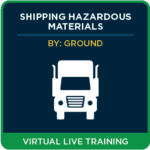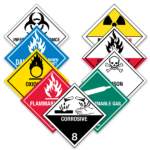
Executive Order 14294 Impacts HazMat Industry
On May 9, 2025, President Trump issued Executive Order 14294. This order is intended to address what the federal government considers “overcriminalization” in federal regulations, including those impacting the hazardous materials (hazmat) industry. The order directs federal agencies, including those regulating hazmat transportation and safety such as the Department of Transportation (DOT) and the Pipelines and Hazardous Materials Safety Administration (PHMSA), to reassess how and when criminal penalties are applied to regulatory violations.
Key Effects on the Hazardous Materials Industry:
The Order will have significant effects on the liability of businesses involved in hazardous materials transport, as follows:
- Reduced Criminal Exposure: Businesses in the hazmat sector may face fewer criminal prosecutions for regulatory infractions unless there is clear evidence of intentional or knowing misconduct. Violations due to ignorance or misunderstanding are now less likely to lead to criminal charges.
- Focus on Harm and Intent: Enforcement will prioritize cases where violations cause or risk significant public harm and where individuals or companies knowingly violated the law—potentially protecting small businesses and individuals from harsh penalties over technical noncompliance.
- Increased Transparency: Agencies must publish lists of all criminal regulatory offenses, their penalties, and the required mental state (mens rea), helping hazmat stakeholders understand and comply with applicable laws.
Key Effects on Regulators:
There will be a shift for regulators away from using criminal enforcement to deter non-compliance. However, civil penalties will remain as an enforcement mechanism.
- Annual Reporting Requirement: Agencies such as PHMSA must annually report and publicly post all criminally enforceable regulations under their purview, including penalty ranges and mental state standards.
- Mens Rea Reform: Agencies must review whether they can establish a default mental state requirement for criminal enforcement and justify any deviation from it. Strict liability offenses (those requiring no proof of intent) are now disfavored and face added scrutiny.
- Regulatory Drafting Changes: Future regulations with criminal penalties must clearly state the applicable mental state and statutory authority, increasing the burden on regulators to craft more precise and justifiable rules.
- Guidance on Enforcement Referrals: Agencies must develop criteria for referring cases to the Department of Justice, weighing factors such as the harm caused, potential gains, the defendant’s industry expertise, and awareness of the regulation.
Conclusion
Overall, this executive order signals a shift toward civil and administrative remedies in hazmat regulation enforcement, reserving criminal prosecution for willful and harmful misconduct. It demands more clarity and accountability from regulators and offers regulated entities greater legal certainty and reduced criminal liability for unintentional infractions.
Do you have questions on potential penalties and how this Executive Order changes things? Unfortunately, such questions are best left to legal counsel. But contact ICC Compliance Center has a team of full-time Regulatory Experts who have years of experience and are certified/recognized in their field of expertise. Ask us your tough questions by calling 888.442.9628 (USA) or 888.977.4834 (Canada) or send us an email.
Stay up to date and sign up for our newsletter!
We have all the products, services and training you need to ensure your staff is properly trained and informed.
 Shipping Hazardous Shipping HazardousMaterials Training |
 UN Approved UN ApprovedPackaging and Boxes |
 Hazard Class Labels Hazard Class Labels |
References:
Federal Register, Presidential Documents, Executive Order 14294, “Fighting Overcriminalization in Federal Regulations”
Wikipedia, Mens Rea



 ICC USA
ICC USA ICC Canada
ICC Canada